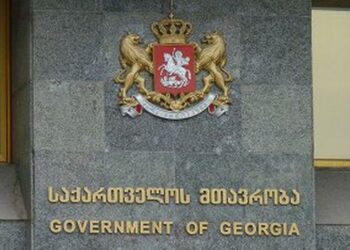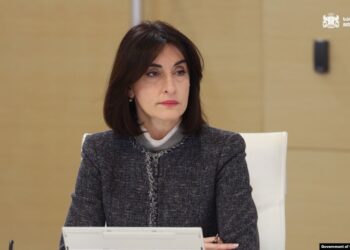“It would be tragic if party politics came in the way of Georgia’s European aspirations” – Sven Mikser, member of the European parliament and former Minister of Defense of Estonia, told Radio Free Europe’s Georgian Service in an interview.
Being European Parliament’s Standing Rapporteur for Georgia, Mikser paid a visit to Georgia last week, meeting the political parties and civil society, as well as visiting the so-called administrative boundary line. There was one word that dominated his lengthy speech in the parliament and that word was “compromise”, as he sought to coral the deeply polarized and antagonistic Georgian political elite towards working together, “at least on strategic goals”.
“In any democracy, elections happen periodically and parties that are in power today should be ready to spend time in opposition in the future, and vice versa. One strategic goal that I feel is actually shared between the opposition and the ruling party is the aspiration to join the European community. So it would be really tragic if party politics came in the way of achieving that goal. The parties should be, and today they are not, tragically, working together on this issue,” Mikser told RFE.
“Despite significant progress over the last years in important areas when it comes to harmonization and implementation of the EU legislation, important work remains to be done, “says Mikser. He was however far less diplomatic as he lamented about the “very, very antagonistic way that politics is being done” that he thinks hinders progress in some key areas.
The Estonian diplomat called on Georgia to be ambitious as he commented on the country’s planned yet unlikely bid for EU membership in 2024, but also offered a somber reminded that Georgia, which went as far as to ingrain its Euro-Atlantic aspirations in its constitution, cannot even boast a candidate status at this point.
“It’s a long way, and there are many reforms that need to be completed before that. So it is some way off actually being ready to be admitted as a member. There’s a lot of work to be done to receive a positive response from the European Union,” said Mikser, who couldn’t resist remarking that if the Georgian politicians are able to put their antagonism and quarrels aside, then a positive answer would be more likely. He urged Georgians to take the reforms seriously, notwithstanding the eventual membership prospects, insisting that the window of opportunity would come for Georgia too, and the country should be ready by then.
“Most of the reforms that are required are beneficial for the economic performance and the welfare of the people, irrespective of whether it leads to membership in the European Union, sooner or later. Windows of opportunity open and close. And it’s important for Georgians to be ready when the window of opportunity opens. Because otherwise they will have to wait much longer.”
Having signed the Association Agreement with the EU back in 2013, Georgia is still in the process of implementing it, with certain reforms, or the lack of thereof, most notably in the judiciary sector, becoming a major concern in the EU, as the current Georgian government seems to be unwilling to fully adhere to the guidelines and instead turned it into a political battle of wills with Brussels.
“The biggest challenge I would say is the judiciary reform, that is one area that is most closely monitored by the European Union, and not least because it was also an important part of the of the agreement facilitated by EC President Michel last year, and we haven’t seen the readiness to actually fully live up to it,” Mikser told RFE, singling out the controversial decision regarding lifetime appointment of supreme court judges, a move that was widely criticized by Georgia’s Western partners. He is convinced, however, that Brussels won’t be the one to budge and accept a compromise on that matter.
“There are certain standards, it’s like becoming a member of an elite sports team, you will have to raise the standards to make it to the national team, you don’t just expect the team to meet you halfway. You need to raise your standards so as to be able to function as a member of that team. And that’s exactly what the European Union membership is about,” Mikser said.
He was keen to provide his take over the concerns regarding the imprisonment of former Georgian President Mikheil Saakashvili, a move many in the West consider politically motivated. Delivering his address in Georgia, Mikser underlined the need “to respect the dignity, safety and right to a fair trial for everyone. When asked in the interview whether that meant the former President wasn’t enjoying those rights at the present, he said that the European Parliament expected the Georgian authorities to take this matter seriously, as “[The situation at present] definitely indicates some problems or shortcomings.”
Interview by Vazha Tavberidze














